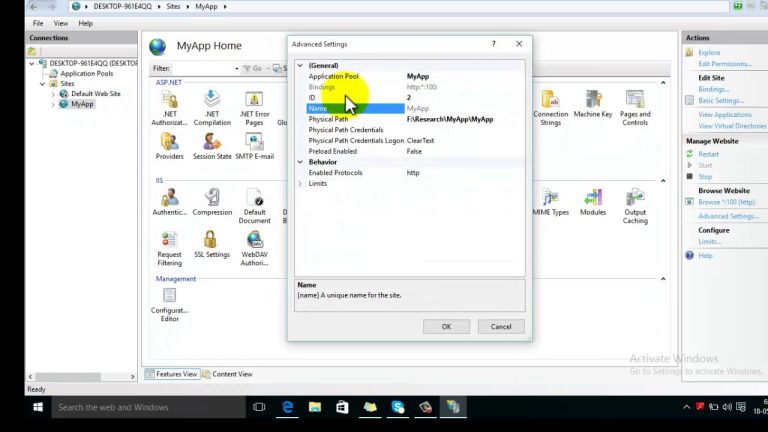Namecheap Vs Google Domains
Picture this: you’ve spent months working on your website, pouring your heart and soul into every detail. You’ve carefully crafted the content, picked out the perfect design, and made sure everything is running smoothly. But have you taken the necessary steps to secure your website? With cyber-attacks becoming increasingly common, it’s more important than ever to protect your website and its visitors. Two popular domain registration and hosting providers, Namecheap and Google Domains offer a range of security features to help keep your website safe. In this article, we’ll compare the security features, user interface, customer support, and integration options of Namecheap and Google Domains to help you make an informed decision about which provider is best for your website.
Overview of Namecheap and Google Domains
You’ll want to know about the two top options for domain registration: Namecheap and Google Domains. Let’s start with Namecheap. Pricing comparison shows that Namecheap is cheaper than Google Domains. Namecheap offers a range of domain extensions at competitive prices, and their renewal rates are also affordable. In addition, they offer free WHOIS privacy protection, which is a great feature for those who want to keep their personal information private. On the other hand, Google Domains is a relatively new player in the domain registration space. They offer a limited range of domain extensions, but their domain transfer process is seamless and easy to use.
They have a clean and user-friendly interface which makes it easy to manage your domains. Google Domains also offers free WHOIS privacy protection for eligible domains. When it comes to choosing between Namecheap and Google Domains, it ultimately depends on your needs. If you’re looking for a wide range of domain extensions at affordable prices and free WHOIS privacy protection, then Namecheap is the way to go. However, if you prefer a simple and easy-to-use interface with a seamless domain transfer process, then Google Domains might be the better option for you.
Security Features
Isn’t it funny how we spend countless hours crafting our website content, only to leave it vulnerable to potential cyber attacks? That’s why it’s crucial to choose a domain registrar that offers top-notch security features. When it comes to Namecheap and Google Domains, both platforms offer various security measures, such as malware detection and SSL certificates. But which one is better for securing your website?
Here are four security features that make Namecheap stand out:
- Two-factor authentication: This extra layer of security requires you to provide a unique code that’s sent to your phone or email before you can log in. It adds an extra step to the login process but makes it much harder for hackers to access your account.
- WhoisGuard: This feature hides your personal information, such as your name and address, from the public WHOIS database. This protects you from spam and identity theft.
- Regular backups: Namecheap automatically backs up your website files and databases daily. This ensures you can restore your site quickly if it gets hacked or crashes.
- PremiumDNS: Namecheap’s PremiumDNS service offers faster speeds, increased security, and better uptime. It’s an excellent option for websites that receive a lot of traffic.
On the other hand, Google Domains offers these security features:
- Free SSL certificates: Google Domains automatically provides SSL certificates for your website. This ensures that all data exchanged between your website and visitors is encrypted and secure.
- Two-step verification: Similar to Namecheap’s two-factor authentication, this feature adds an extra layer of security to your account.
- Custom roles: You can assign different roles to team members, such as ‘administrator’ or ‘billing.’ This helps you control who has access to sensitive information.
- DNSSEC: This feature adds an extra layer of security to your domain’s DNS system, preventing DNS spoofing and other attacks.
When it comes to security features, both Namecheap and Google Domains offer excellent options. It ultimately comes down to your specific needs and preferences. Consider the features that matter most to you when making your decision.
User Interface and Customer Support
As you navigate through the process of securing your website, it’s important to consider the user interface and customer support of your domain registrar. When comparing Namecheap and Google Domains, both offer a user-friendly interface that simplifies the domain registration process. However, Namecheap’s interface is more beginner-friendly with simpler navigation and clearer instructions. Google Domains, on the other hand, offers a more advanced interface with more options for customization.
When it comes to customer support, both Namecheap and Google Domains offer 24/7 support through various channels such as live chat, phone, and email. However, Namecheap’s customer support is known for being more responsive and helpful, with shorter wait times and more knowledgeable representatives. Google Domains’ customer support, while still reliable, may take longer to get a response from.
In terms of pricing, both Namecheap and Google Domains offer competitive pricing plans for domain registration and web hosting. However, Namecheap often has more affordable options with frequent sales and discounts. Google Domains, while slightly more expensive, offers more advanced features such as domain forwarding and email forwarding at no additional cost. Ultimately, when deciding between Namecheap and Google Domains, it’s important to consider your specific needs and priorities in terms of user interface, customer support, and pricing.
Integration with Other Services
If you want to expand your online presence and streamline your website management, it’s essential to consider how well your domain registrar integrates with other services. When it comes to API integration, Namecheap and Google Domains both offer comprehensive solutions. Namecheap provides access to a range of APIs, including those for domain registration, SSL certificates, and email hosting. On the other hand, Google Domains offers APIs for domain registration and DNS management, making it easier to integrate with other Google services such as Google Cloud Platform.
In terms of third-party plugins, both Namecheap and Google Domains offer integrations with popular website builders such as WordPress, Wix, and Squarespace. However, Namecheap goes a step further by offering integrations with other services such as G Suite, which includes email, calendar, and other productivity tools. Additionally, Namecheap also offers integrations with payment providers such as PayPal and Stripe, making it easier to set up and manage online transactions.
Overall, both Namecheap and Google Domains offer strong API integration and third-party plugin options. However, if you’re looking for a more comprehensive solution that integrates with a wider range of services, Namecheap may be the better option. With its access to a range of APIs and integrations with other services such as G Suite and payment providers, Namecheap can help streamline your website management and make it easier to expand your online presence.
Final Verdict and Recommendations
So, which domain registrar should you choose? Let’s take a look at the final verdict and some recommendations. When considering the pricing comparison, Namecheap offers more affordable options for domain registration and renewal. However, Google Domains offers free WHOIS privacy protection, which can add up to savings in the long run. On the other hand, Namecheap provides a cheaper domain transfer process with free domain transfer and renewal reminders. When it comes to the domain transfer process, both Namecheap and Google Domains provide an easy and straightforward way to transfer your domain.
Namecheap offers a transfer guide and a domain transfer concierge service, while Google Domains provides a step-by-step guide and a transfer lock feature for added security. Overall, both domain registrars offer a hassle-free transfer process. In conclusion, both Namecheap and Google Domains are great options for securing your website. If you’re looking for affordability, Namecheap is your best bet. However, if you value privacy protection and security, Google Domains is the way to go. Ultimately, the decision depends on your specific needs and preferences.
FAQs
What is the process for transferring a domain from one registrar to another?
Transferring your domain from one registrar to another can seem like a daunting task, but it’s actually quite simple. The first step is to obtain an authorization code, also known as an EPP code, from your current registrar. This code confirms that you are the rightful owner of the domain and gives permission for the transfer to take place.
Once you have the authorization code, you can initiate the transfer process with your new registrar. This typically involves filling out a form and paying a transfer fee. During the transfer process, your domain may experience a brief period of downtime, so it’s important to plan accordingly. Overall, the transferring process can take anywhere from a few days to a few weeks, depending on the registrars involved.
Are there any restrictions on the types of SSL certificates that can be used with Namecheap or Google Domains?
When it comes to SSL compatibility and domain security measures, you may be wondering if there are any restrictions to using Namecheap or Google Domains. The truth is, that both registrars offer a range of SSL certificates that are compatible with their services. However, it’s important to note that certain SSL certificates may require additional setup or configuration. Additionally, it’s always a good idea to prioritize domain security measures such as using strong passwords, enabling two-factor authentication, and regularly updating your website software. By taking these steps, you can help ensure that your website stays secure and protected.
Can I purchase a private registration option for my domain to keep my personal information confidential?
If you want to keep your personal information confidential, purchasing a private registration option for your domain is a smart move. Both Namecheap and Google Domains offer this feature, but there are some differences to consider. With Namecheap, the private registration option is included for free with every domain purchase. This means that your personal information will be replaced with Namecheap’s contact information in the WHOIS database.
On the other hand, Google Domains charges an additional fee for private registration. However, their service also includes a privacy proxy, which forwards messages to your email without revealing your personal information. Ultimately, the advantages of private registration are clear – it protects you from unwanted solicitations, spam emails, and potential identity theft. When comparing the private registration options between Namecheap and Google Domains, consider the cost and features to determine which one is the best fit for your needs.
Are there any hidden fees or charges when using Namecheap or Google Domains for domain registration and management?
When it comes to registering and managing your domain, it’s important to know if there are any hidden costs or charges. Comparing features between domain registrars like Namecheap and Google Domains can help you avoid any unexpected fees. Both Namecheap and Google Domains offer transparent pricing with no hidden charges. However, it’s important to note that some additional services, such as private registration, may come at an extra cost. It’s always a good idea to carefully review the pricing and features before making a decision to ensure you get the best value for your money.
How do Namecheap and Google Domains compare in terms of pricing for domain registration and renewal fees?
When it comes to domain registration and renewal fees, both Namecheap and Google Domains offer competitive pricing. However, Namecheap stands out for its Domain Privacy feature, which allows you to keep your personal information private and protected from potential spammers and hackers. Additionally, Namecheap offers renewal discounts for domain registrations that are renewed before they expire, making it a great option for those who want to save money in the long run. On the other hand, Google Domains offers straightforward pricing without any hidden fees or charges, making it a reliable choice for those who prioritize transparency in their domain management.
Ultimately, both Namecheap and Google Domains have their own unique strengths and weaknesses, so it’s up to you to decide which one best fits your needs. Overall, both Namecheap and Google Domains are excellent options for securing your website. However, if you’re looking for a provider that offers a more comprehensive set of security features and exceptional customer support, then Namecheap may be the better choice for you.
On the other hand, if you prefer a more straightforward user interface and integration with other Google services, then Google Domains may be the way to go.
Ultimately, the decision comes down to your personal preferences and needs. It’s essential to weigh the pros and cons of each provider carefully and select the one that aligns with your goals. Whichever one you choose, rest assured that your website will be in good hands, and you can focus on creating quality content and growing your online presence. So, take the time to research and make an informed decision, and you’ll be on your way to a secure and successful website.




